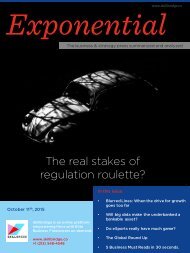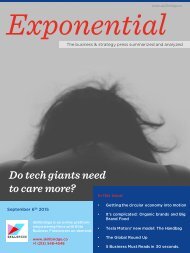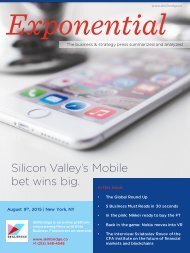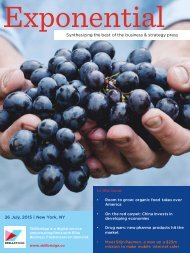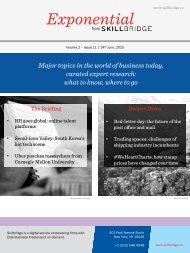Exponential 25
In this issue: Are you Siri-us? Boom in voice-recognition predicted Is 1099 the true code for our age? Bloomberg faces fresh competition The Global Round Up 5 Business Must Reads in 30 seconds.
In this issue:
Are you Siri-us? Boom in voice-recognition predicted
Is 1099 the true code for our age?
Bloomberg faces fresh competition
The Global Round Up
5 Business Must Reads in 30 seconds.
- No tags were found...
You also want an ePaper? Increase the reach of your titles
YUMPU automatically turns print PDFs into web optimized ePapers that Google loves.
www.skillbridge.co<br />
<strong>Exponential</strong><br />
September 20 th , 2015<br />
The business & strategy press summarized and analyzed<br />
Image: Apple.<br />
“The Future of TV is Apps?”<br />
In this issue:<br />
• Are you Siri-us? Boom in voicerecognition<br />
predicted<br />
• Is 1099 the true code for our age?<br />
• Bloomberg faces fresh competition<br />
• The Global Round Up<br />
• 5 Business Must Reads in 30 seconds.<br />
Skillbridge is the leading online platform<br />
empowering firms with Elite Business<br />
Freelancers on demand.<br />
www.skillbridge.co | +1 (212) 548-4548<br />
1 +1 (212) 548 4548 www.skillbridge.co
<strong>Exponential</strong> the Skillbridge Magazine<br />
The global round-up<br />
High-speed rail in US<br />
Brazil debt<br />
A joint venture between a<br />
consortium of Chinese rail firms<br />
and US company Xpress West will<br />
build a high speed rail line<br />
between Los Angeles and Las<br />
Vegas. Services will carry<br />
passengers between the cities in<br />
80 minutes, at speeds of up to<br />
150mph. Analyst Gary Wong<br />
estimates that the project is worth<br />
$5 billion and will bring little<br />
direct financial benefit to the<br />
Chinese firms. It will, however,<br />
offer them strong expansion<br />
opportunities.<br />
waklingsf via<br />
flickr<br />
Fresh from awarding Brazil's<br />
sovereign debt “junk” status a week<br />
ago, Standard & Poor's has<br />
downgraded numerous large<br />
Brazilian companies including<br />
several banks. Almost half a million<br />
jobs have been lost in the Brazilian<br />
economy since January.<br />
Researchers from Fundação Getulio<br />
Vargas predict that another 2.5<br />
million employees could be out of<br />
work by the end of 2016. The OECD<br />
predicts a 2.8% fall in GDP this year<br />
and 0.7% in 2016.<br />
2 +1 (212) 548 4548 www.skillbridge.co
<strong>Exponential</strong> the Skillbridge Magazine<br />
Crackdown on Nigerian graft<br />
On Tuesday a deadline passed for<br />
all Nigerian government<br />
departments to ensure financial<br />
transactions pass through a single<br />
bank account. The account is being<br />
managed by Nigeria's central bank<br />
and commercial banks are<br />
estimated to lose out on $10 million<br />
as a result. President Buhari hopes<br />
the move will stem corruption by<br />
government officials which he<br />
estimates has amounted to $150<br />
billion over the past 10 years<br />
Shell in Australia<br />
Shell's planned $70 billion takeover<br />
of BG Group faces a roadblock as<br />
the Australian Competition and<br />
Consumer Commission says it will<br />
delay a decision until November 12.<br />
The Commission has received<br />
multiple messages of concern from<br />
businesses who argue that Shell<br />
might limit local supply in favor of<br />
lucrative exports of Liquefied<br />
Natural Gas (LNG) to Asia.<br />
Competition for Google in China<br />
Indian mobile advertising firm<br />
InMobi has announced that it is to<br />
partner Chinese Android software<br />
customisation start-up APUS. InMobi<br />
hopes that the tie-up will enable it to<br />
reach 500 million new users in China<br />
and elsewhere by 2016. InMobi, which<br />
became profitable in the last quarter<br />
of 2014 and already reaches 1.4 billion<br />
devices, competes with Google and<br />
Facebook in the $100 billion global<br />
mobile advertising market. The deal<br />
follows reports that Google is<br />
preparing to re-enter the Chinese<br />
market.<br />
3 +1 (212) 548 4548 www.skillbridge.co
<strong>Exponential</strong> the Skillbridge Magazine<br />
Television’s App(le)<br />
Revolution<br />
• Americans currently consume most of their TV via apps – 30 mins a day more<br />
on apps than through traditional TV units.<br />
• Apple’s iOS platform has over 50% of the growth in App-based TV watching<br />
Mike Deer koski<br />
Apps instead of Channels?<br />
“Our vision for TV is simple, and perhaps a little provocative.<br />
We believe the future of television is apps” - Apple CEO Tim<br />
Cook. While the eyes of the media were focused on the launch<br />
of the new iPhone 6S, Apple's TV service, which Steve Jobs<br />
described as a hobby, has suddenly got serious, with a dedicated<br />
app store and a Siri-enabled remote to let users talk to their<br />
TVs. CEO of AMC Networks Josh Sapan declared the new<br />
Apple TV is “a little more exciting than terrifying but terrifying<br />
if you want to worry about it”.<br />
4 +1 (212) 548 4548 www.skillbridge.co
<strong>Exponential</strong> the Skillbridge Magazine<br />
Has TV already gone app?<br />
Moving from a channel to an app-based model offers liberation<br />
from the traditional constraints of TV scheduling. In fact, users<br />
have already started the shift, analysis by Yahoo executive<br />
Simon Khalaf point to Americans on average spending 30<br />
minutes longer each day using apps than watching TV. Further,<br />
Apple is already showing healthy engagement in the space: Over<br />
the last 18 months, iOS devices have seen the greatest<br />
percentage growth in video streaming in the US – triple that of<br />
Android and other devices according to Strategy Analytics.<br />
Apple’s ecosystem enjoys a set of distinctive advantages over its<br />
internet TV only rivals especially when it comes to offering<br />
different formats like shopping apps and screening games sideby-side<br />
with TV shows.<br />
But it’s not just about technology, it’s about content too…<br />
For Apple TV to be a disruptive force, it needs access to<br />
content, and not just “partners that don’t threaten Apple’s own<br />
media business”, says the WSJ. Apple has been in discussion<br />
with the likes of NBC, CBS and Fox about bundling content<br />
into a streaming subscription service. Talks with prospective<br />
partners have been going on for years but have so far only<br />
secured a single tie-up with HBO. The networks need an<br />
incentive to break with practice in their profitable industry,<br />
and Apple needs to offer consumers an attractive deal in what<br />
is already becoming a crowded streaming market. Some say<br />
that even with a streaming deal, an Apple TV app would not be<br />
revolutionary because of the dominance of Netflix and wellestablished<br />
apps.<br />
What the brains think…<br />
Marcel Fenez of PwC lays down the challenge for Apple<br />
TV: "What matters is the ability to combine content with a user<br />
experience that's differentiated and compelling on the<br />
consumer's platform of choice". Asked which non-traditional<br />
broadcaster they would prefer to offer them access to video,<br />
Accenture survey participants in 2014 named Google, Apple and<br />
Samsung in that order. Meanwhile, Deutsche Bank analyst Bryan<br />
Craft thinks Apple TV could help networks like CBS because they<br />
will be "must haves" in its streaming bundles, and the result may<br />
be rising numbers of pay TV subscribers.<br />
Key Reading<br />
• WSJ:First Look:<br />
Apple TV heads in a<br />
new direction<br />
• FT:Apple TV wants<br />
viewers to change<br />
channel<br />
• WSJ:Apple plans<br />
web TV service in<br />
fall<br />
• Accenture:Bringing<br />
TV to life: Issue V<br />
5 +1 (212) 548 4548 www.skillbridge.co
<strong>Exponential</strong> the Skillbridge Magazine<br />
Is 1099 the real code<br />
for our age?<br />
• The gig economy now accounts for a third of the American workforce.<br />
• By 2020 66m Americans are expected to be freelance or 1099 workers.<br />
The unstoppable rise of the gig economy<br />
53 million Americans, or 34% of the workforce, are now 1099<br />
workers. The category covers the full spectrum of freelancing,<br />
from independent contractors, to temps, and on to occasional<br />
moonlighters. The number of 1099 contractors is expected to<br />
grow by over 4% a year through 2020 to around 66 million<br />
people. The trend is driven by a combination of new technology<br />
and age-old incentives. Freelancers are cheaper for companies<br />
who cut down on payroll costs and benefit outlays, while<br />
workers are granted greater flexibility. A Roosevelt<br />
Institute/Kauffmann Foundation joint report argues that, by<br />
2040, the US economy will be "scarcely recognisable".<br />
:<br />
6 +1 (212) 548 4548 www.skillbridge.co
<strong>Exponential</strong> the Skillbridge Magazine<br />
Does everyone really want the gig?<br />
The attractions of being a 1099 are by no means universal,<br />
due to the lack of job security and employment rights. 53% of<br />
people freelance by choice, 47% out of economic necessity. While<br />
many contractors revel in the flexibility and control freelancing<br />
can provide, others are increasingly keen to win employee status.<br />
Particularly in blue-collar segments a small, but growing number<br />
of Uber drivers and other 1099s working for Postmates, Lyft and<br />
Washio are fighting legal battles to be classified as employees and<br />
not contractors. House cleaning start-up, Homejoy, closed partly<br />
as a result of the weight of such lawsuits. The rise of the “gig<br />
economy” presents governments with serious problems. While<br />
entitlement systems are built around the conception of a fixed<br />
job, revenues from payroll taxes are set to fall sharply.<br />
Current legislation not designed for today’s economy<br />
A number of analysts believe that an urgent change in legislation<br />
is required with the introduction of an intermediate classification<br />
between “worker” and contractor”. Germany's "dependent<br />
contractor" status provides a model that combines protection<br />
with flexibility. Simon Rothman, an investor in delivery service<br />
platform Sprig, argues for the adoption of such a model. Noting<br />
that 38% of on-demand workers are signed up to multiple<br />
companies, he wants to see personalized healthcare travel with<br />
the employee. According to tech evangelist Tim O'Reilly,<br />
however, legal changes amount to little more than a sop. Reilly<br />
points out that companies who are nervous of legal action are<br />
already switching workers from 1099 to W2 tax codes and are<br />
capping employees' hours so they become part-time and do not<br />
receive benefits. "We've basically gutted wages for working<br />
people, and we're wondering what's happening", he says.<br />
What the brains think…<br />
In June, a McKinsey Global Institute Report suggested that<br />
online talent platforms - ranging from job sites like Monster.com,<br />
to digital marketplaces like TaskRabbit and talent management<br />
agencies such as PayScale and ReviewSnap - could boost global<br />
GDP by 2% or $2.7 trillion by 20<strong>25</strong>. Platforms could have the<br />
positive impact of increasing employment by 72 million full-time<br />
equivalents. The authors argue that a successful transition to the<br />
“gig economy” requires not only new labor market regulations,<br />
but also affordable broadband access for all and clearer rules in<br />
the thorny areas of data ownership and privacy.<br />
Key Reading<br />
• Economist: Part-time<br />
palaver<br />
• Business Insider: Tim<br />
O'Reilly: The argument<br />
over whether Uber<br />
should have contractors<br />
or employees is "fake"<br />
• FT:Employers tap "gig"<br />
economy in search of<br />
freelancers<br />
• McKinsey:Connecting<br />
talent with opportunity<br />
in the digital age<br />
7 +1 (212) 548 4548 www.skillbridge.co
<strong>Exponential</strong> the Skillbridge Magazine<br />
Google, Facebook, Microsoft and<br />
Apple want you to talk.<br />
• Technology’s Giants are at war each competing for the prize of helping<br />
consumers with virtual assistants.<br />
• 38% of Americans use at least one of these services.<br />
Get ready for the “AI spring”<br />
:<br />
With the launch of Proactive Assistant as a feature of iOS 9,<br />
Apple is readying itself for what the FT has termed the “AI<br />
spring”. Google Now, Microsoft Cortana, Facebook M and<br />
Amazon Alexa are voice-activated virtual assistants, engaged in<br />
a heavy weight scramble. The competing services are based on<br />
advances in speech recognition and predictive technologies.<br />
Increasingly, they can offer users information before they have<br />
requested it. Some, like Microsoft’s Cortana assistant, ask<br />
users’ permission before volunteering their predictions.<br />
8 +1 (212) 548 4548 www.skillbridge.co
<strong>Exponential</strong> the Skillbridge Magazine<br />
Voice recognition software shows rapid expansion<br />
What explains the sudden rush into AI? Firstly, the market is<br />
expanding rapidly. Research firm Gartner found that 38% of<br />
American consumers had used virtual-assistant services but<br />
estimates that two-thirds of consumers in developed markets will<br />
use them daily by the end of 2016. Digital assistants are a means<br />
for tech giants to showcase their technological brilliance with<br />
firms hoping they can tie loyal customers into revenuegenerating<br />
services. For Apple, this means repeat iPhone<br />
purchasers; for Google, it involves increasing user numbers for<br />
advertisers. The anticipatory power of the software paves the way<br />
for future “intelligent” products including smart watches and<br />
connected automobiles.<br />
The proxy war for future supremacy<br />
The competition for AI supremacy masks the much bigger battle<br />
over who wins market dominance in the next stage of the<br />
internet’s development. Predictive functions put the vigor back<br />
into search after Apps and strengthening offers from e-commerce<br />
sites have bypassed the need for it in many situations. There is a<br />
particular fight between Apple’s Siri and Google Now. Google sets<br />
its store by an open approach involving pervasive data trawling<br />
and targeted advertising - risking accusations of "creepiness".<br />
Apple is taking steps to safeguard user privacy, but it has less data<br />
on which to build useful predictions because most Apple services<br />
work only on Apple devices. In a world of siloed-off apps, all these<br />
services are competing to form deep links which can delve into<br />
apps for data. And each of them seeks to provide a single interface<br />
for users’ every engagement with retailers online.<br />
What the brains think…<br />
AI is likely to be key to future developments in the workplace. A<br />
2014 Accenture report forecast the rise of virtual digital<br />
assistants which will work in tandem with advanced robotic<br />
devices, 3D printers, wearables and collaboration software.<br />
Accenture predicts a reshaping of work practices "like never<br />
before” which will paradoxically “humanise” work. As for e-<br />
commerce, in January Gartner predicted that by the end of 2016,<br />
more than $2 billion in online shopping will be performed<br />
exclusively by mobile digital assistants. This equates to 2.5<br />
percent of mobile users entrusting assistants with $50 per year.<br />
Key Reading<br />
• Economist: The<br />
software secretaries<br />
• WSJ:Apple and<br />
Google know what<br />
you want before you<br />
do<br />
• FT:Artifical<br />
intelligence: a virtual<br />
assistant for life<br />
• FT:Apple and Google<br />
brew up battle over<br />
future of mobile<br />
devices<br />
• Accenture:<br />
Workforce of the<br />
Future<br />
9 +1 (212) 548 4548 www.skillbridge.co
<strong>Exponential</strong> the Skillbridge Magazine<br />
Game of Thrones gets<br />
hearts beating<br />
Brandon Ballinger<br />
In Westeros they thought magic was gone from the<br />
world, but ex-Google employee Brandon Ballinger begs<br />
to differ. Using his heart monitoring Apple Watch app<br />
Cardiogram, Ballinger tracked the heartbeats of 10<br />
volunteers watching episodes from Series 5 of Game of<br />
Thrones and revealed marked fluctuations during battle<br />
scenes. Ballinger wants to enlist Cardiogram users with<br />
heart arrhythmia to share data with the University of<br />
California's Health eHeart Study. The aim is to enrol up<br />
to one million participants. “I think it’s a great way to<br />
capture data passively,” says Iltifat Husain of Wake<br />
Forest School of Medicine. “From a research standpoint,<br />
the possibilities are huge.”<br />
10 +1 (212) 548 4548 www.skillbridge.co
Unchanged<br />
<strong>Exponential</strong> the Skillbridge Magazine<br />
Winners and Losers<br />
Good Week For: Unruly<br />
The London-based video advertising and tech company<br />
has been snapped up by News Corp for $90 million upfront,<br />
plus up to $86 million based on performance. One<br />
of the three venture capital firms exiting Unruly said the<br />
firm made $50 million in the most recent financial year,<br />
which would represent an increase of almost 200%.<br />
Bad Week For: Yahoo<br />
Key staff including chief marketing officer Kathy Savitt and<br />
head of European operations Dawn Airey have left, while<br />
the IRS has announced that it would not rule on whether<br />
the internet company can spin off its shares in Alibaba in a<br />
tax-free manner.<br />
Good Week For: Delta<br />
Amid record $1 billion profits in the second quarter, the<br />
Atlanta-based carrier has pledged a 14.5% increase in<br />
basic pay for ground staff and flight attendants. The<br />
airline is opening three airport "sky spas" for employees<br />
starting next month.<br />
Bad Week For: Sprint<br />
The telecoms and wireless services provider's stock fell 5.5%<br />
on Wednesday after Moody's downgraded its credit rating<br />
from B1 to B3. Moody’s cited "brutal competition" in the<br />
wireless industry and doubts about the company's ability to<br />
refinance more than $12 billion of debt.<br />
11 +1 (212) 548 4548 www.skillbridge.co
Five key reads<br />
aiigle_dore via flickr<br />
FT: Symphony's disruptive message for traders<br />
Goldman Sachs's Symphony financial services messaging<br />
system launched on Tuesday, and will attempt to show it is more<br />
efficient and more affordable than Bloomberg. The service<br />
emerged from the 2013 snooping scandal, when Bloomberg<br />
news reporters used the company's terminals to spy on bankers.<br />
Symphony's CEO David Gurle was recruited to Thomson<br />
Reuters from Microsoft 12 years ago to produce a new<br />
messaging product that failed to dislodge Bloomberg from its<br />
market leader position. Banks often do not install $21,000+<br />
Bloomberg terminals in both front and back offices and have to<br />
rely on alternative messages of internal communication, Mr.<br />
Gurle said: "Part of the allure of Symphony is to say that<br />
collaboration and communication should be a relatively open<br />
initiative. Even a desk clerk should be able to use it if that<br />
person needs access to trade records.”<br />
Forbes: Army tech spending collapses as enemies close gap<br />
The US Army has seen a decline of $100 billion in its base annual<br />
funding under President Obama to $127 billion, and its<br />
procurement and R&D budgets have been particularly badly hit.<br />
Almost all the major combat systems the service relies on date<br />
back to the Reagan years or earlier, but the Pentagon prioritises<br />
new hardware for the Navy and Air Force, and manpower<br />
programs within the Army. Development of troop carrier the<br />
Future Fighting Vehicle will not begin until the 2028, meaning it<br />
probably won't be fielded until 2040. The Army has fenced off a<br />
dozen weapons programs, some upgrades, some new systems, but<br />
fears the day approaches when it will meet an equally<br />
technologically sophisticated enemy.<br />
12 +1 (212) 548 4548 www.skillbridge.co
<strong>Exponential</strong> the Skillbridge Magazine<br />
The Briefing<br />
WSJ: Big retailers, delivery firms face struggle to find holiday<br />
workers<br />
With US unemployment at a 7 year low, employment agencies for<br />
retailers and logistics companies say they are having trouble<br />
finding warehouse workers to stock early holiday inventory.<br />
Starting warehouse wages have been rising by up to $3 an hour in<br />
some markets. Amazon, Walmart, Target and other retailers have<br />
been building warehouses quickly to get online orders to their<br />
customers and are now likely to take a hit. Last minute online<br />
shoppers should beware of the possibility of pre-Christmas delays<br />
that will make the last two years look punctual by comparison.<br />
Forbes: Dislike this: Is Facebook's new button really such a big<br />
deal?<br />
Pressure groups warn that Facebook's plan to introduce a<br />
"dislike" button could lead to bullying and hate crime. Professor<br />
Andre Spicer of Cass Business School in London points to<br />
upsides of being able to express negative emotions - helping<br />
people blow off steam, point to problems without obvious<br />
solutions and blow the whistle on inappropriate behaviour. Is it<br />
really any more than a gimmick? Will it encourage the millennial<br />
generation to join the same site as their parents - and isn't the<br />
whole act of "liking" past its sell-by date, like the Facebook poke?<br />
Bloomberg: Art investment platform draws crowdfunders into<br />
the scene<br />
A Kickstarter-style project is reinventing the traditional art<br />
gallery model. Using New York and London-based crowdfunding<br />
platform Art:i:curate, collectors can buy a stake in an emerging<br />
artist’s work for just $10. The artist initially sells 40% of the<br />
listed price of the work to the crowd, receiving the money up<br />
front, then gets a further 30% when the work is sold, the rest<br />
going to the investors, minus running costs. Investors stand to<br />
get back over $150 if they put $100 in, but only if the work sells<br />
for the marked price. Art:i:curate’s co-founder Irina Turcan, a<br />
former investment banker at Nomura wants to go global with the<br />
initiative: “we are already in more than 30 countries.”<br />
13 +1 (212) 548 4548 www.skillbridge.co
<strong>Exponential</strong> the Skillbridge Magazine<br />
h<br />
The Interview<br />
• This week’s interview is with Nicole Van Der Tuin, the<br />
CEO and Co-Founder of First Access<br />
• First Access is a New York based startup delivering<br />
the first instant risk scores and data marketplace for<br />
emerging economies, enabling the next 2.5B people to<br />
build financial identities using their mobile data.<br />
What's the aim of First Access?<br />
We’re trying to reduce the cost of<br />
lending and borrowing in developing<br />
markets, which are very high because<br />
there's not much reliable information<br />
about approximately 3 billion people<br />
who don't have formal documentation<br />
of their financial identities. The credit<br />
industry relies on in-person visits that<br />
can take days. Agents are looking for<br />
personal and business expenses,<br />
assets, liabilities, what their house is<br />
made of, looking at photos on the wall<br />
to see if they are of the person taking<br />
out the loan because people will often<br />
borrow each others’ houses to use as<br />
collateral. As lending costs are so high,<br />
when you're giving very small loans<br />
the per person costs are very high, and<br />
you can imagine what the interest<br />
rates are: easily into the hundreds of<br />
percentage points.<br />
Many New York and London Fintech<br />
start-ups are attempting to rewrite<br />
the credit record for their local<br />
markets, you’re doing this in mainly in<br />
Africa - how does it differ?<br />
In emerging markets more people now<br />
have mobile phones and so we partner<br />
with mobile carriers. We earn a<br />
margin by taking their raw phone<br />
payment information and processing<br />
it into a credit score - so if somebody<br />
comes to a bank and says, I would like<br />
a loan of $400 to buy a new sewing<br />
machine, the bank can enter her<br />
number into our software and she gets<br />
a text message to ask her permission<br />
to share her mobile activity. We made<br />
the credit scores much more<br />
actionable for financial institutions in<br />
developing countries by<br />
recommending a specific loan size or<br />
other terms.<br />
14 +1 (212) 548 4548 www.skillbridge.co
<strong>Exponential</strong> the Skillbridge Magazine<br />
h<br />
What inspired you to go into this?<br />
It started with a love of languages – I grew<br />
up speaking a fair bit of French. I moved to<br />
China after I graduated partly to learn<br />
Mandarin. I had some experiences in college<br />
and abroad that opened my eyes to how<br />
much difference a single person can make<br />
and I've always been sort of obsessive about<br />
trying to do better at scale. I started working<br />
for Planet Finance, a French NGO in China,<br />
Madagascar and Senegal. A big part of my<br />
job was to go out with loan officers to do<br />
evaluations and I just felt beaten around the<br />
head with how labor intensive, subjective<br />
and expensive the process is. I learned<br />
calculus, did a masters in economic<br />
development at Columbia and along the way<br />
realized that SIM card registration would be<br />
a huge, unprecedented opportunity to get<br />
people access to credit. My co-founder<br />
Duncan Goldie Scott got talking about this<br />
at a micro-finance event; I raised capital for<br />
it and here we are. I feel very lucky that I was<br />
in a position to take the leap and have<br />
mentors - New York is a really incredible<br />
place for that.<br />
As an American working in Tanzania, you<br />
must have experienced some interesting<br />
cultural differences.<br />
I find Tanzania to be a very easy going place<br />
so not as many as you might expect. The first<br />
time I went (in 2011), I thought it would be<br />
great if not pie in the sky to speak to<br />
someone from the central bank. I was having<br />
coffee with the one person I knew in<br />
Tanzania and he was like, hold on. He made<br />
some calls and came back saying I got you a<br />
meeting. I was expecting him to say they'll<br />
meet with you in 2017. Instead he was like,<br />
how is 2:30? The warm reception to new<br />
ideas has been energizing.<br />
What's changed in the last five years?<br />
Sim card registration is now required in<br />
almost every developing country - it's<br />
fundamental because those top up scratch<br />
cards are the first formal transaction that<br />
most of the world's poorest have ever had<br />
access to and now they're associated with<br />
people's names so you can turn them into an<br />
asset. We’ve got some awesome case studies<br />
with the institutions we've been working<br />
with who in total serve around 33 million<br />
people. Mobile money despite its incredible<br />
success in some places is not nearly as<br />
useful because it just doesn't have the<br />
network. We don't ride on mobile money<br />
rails for that reason.<br />
What do you see as the next main trend in<br />
this sector?<br />
I guess some kind of an arms race between<br />
Google and Facebook to connect the offline<br />
world - because Facebook bought this<br />
drones company, and Google invested a<br />
billion dollars in SpaceX. There's a lot of<br />
discussion about whether traditional<br />
financial institutions are going to or be<br />
supplanted by non-bank financial<br />
institutions offering credit based on<br />
digital. I don't believe that that's true - I<br />
think financial institutions with an incountry<br />
presence will be critical at least for<br />
the next 5-8 years.<br />
Nicole Van Der Tuin is the CEO & Co-Founder of First Access.<br />
Her career has been spent furthering investment into developing<br />
economies, notably at the Aspen Institute and PlaNet Finance.<br />
She holds an MPA from Columbia University.<br />
15 +1 (212) 548 4548 www.skillbridge.co
<strong>Exponential</strong> the Skillbridge Magazine<br />
We heart h charts<br />
Trane de Vore via flickr<br />
The medium is the message<br />
Almost two-thirds of US Twitter and<br />
Facebook users get news from social<br />
networking sites - up from around<br />
half in 2013 according to a study by<br />
the Pew Research Center. Newsoriented<br />
Twitter users are almost<br />
twice as likely to follow breaking<br />
stories on the site as opposed to other<br />
sources such as Facebook.<br />
Source: Pew Research Center<br />
Manufacturing isn’t dead<br />
Source: Thomson Reuters in the Economist<br />
European differences<br />
Eurostat figures show sharp regional<br />
differences in how European<br />
households spend their budgets. The<br />
Germans spend most on healthcare,<br />
more than triple the spend of NHSloving<br />
Britons. Housing costs are<br />
highest in Denmark and lowest in<br />
Malta where 17.9% of household<br />
spending goes on restaurants or<br />
hotels.<br />
Source: Economist<br />
Tanking it<br />
Bloomberg's map of global gasoline prices<br />
from October 2014 to July 2015 shows<br />
falls of varying degrees across the world.<br />
In Venezuela, prices have collapsed 97<br />
percent and 20 SUVs can be filled up for<br />
less than a dollar.<br />
Global Gasoline Price Changes<br />
Source: Bloomberg<br />
16 +1 (212) 548 4548 www.skillbridge.co




